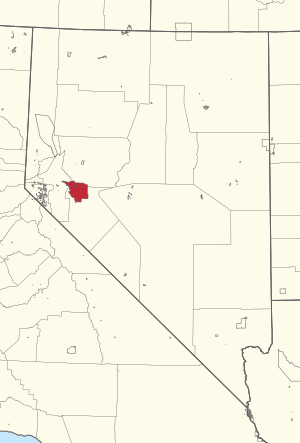Walker River Indian Reservation facts for kids
| Total population | |
|---|---|
| Enrolled members: 900 | |
| Regions with significant populations | |
| Languages | |
| English and Northern Paiute | |
| Religion | |
| Christianity | |
| Related ethnic groups | |
| Pyramid Lake Paiute, Northern Paiute peoples |
|
Walker River Indian Reservation
|
|
|---|---|

Location of the Walker River Indian Reservation
|
|
| Tribe | Walker River Paiute Tribe |
| Country | United States |
| State | Nevada |
| Area | |
| • Total | 1,372.62 km2 (529.970 sq mi) |
| Website | Walker River Paiute Tribe |
The Walker River Indian Reservation is a special area of land in central Nevada, United States. It is the home of the Walker River Paiute Tribe. This tribe is a group of Northern Paiute people officially recognized by the U.S. government.
The tribe includes two main groups of Northern Paiute people. The larger group is called the Aga'idökadö, which means "Cutthroat trout Eaters". The smaller group is the Pakwidökadö, or "Chub carp Eaters".
Contents
Who are the Walker River Paiute?
The Walker River Paiute Tribe is a Native American tribe. They are part of the larger Northern Paiute people. The tribe has about 900 members today. They speak English and also their traditional language, Northern Paiute.
Where is the Reservation Located?
The reservation is found along the Walker River in Nevada. It is located between the towns of Yerington and Walker Lake. The Paiute name for Walker Lake is Hagi.
Most of the reservation land is in Mineral County. Smaller parts are in Lyon County and Churchill County. The total size of the reservation is about 530 square miles.
Life and Land on the Reservation
The only town on the reservation is Schurz. In the year 2010, about 746 people lived there. A very important person in Native American history, Wovoka, is buried in Schurz. Wovoka was the creator of the Ghost Dance, a spiritual movement in the 1800s.
A large water storage area called Weber Reservoir is on the Walker River. It helps provide water for farming on the reservation. Because of the dry conditions, much of the reservation land is used for raising cattle.
Standing Up for Rights
In 2016, the Walker River Paiute Tribe worked with the Pyramid Lake Paiute Tribe. They filed a lawsuit in federal court. This lawsuit was to make sure there were voting places on their reservations. Before this, tribal members had to travel very far to vote.
Having polling places on the reservations made it much easier for people to vote. When early voting started in 2016 on the Walker River reservation, many people came out. The number of voters in just two days was almost as high as the total number of voters in the 2012 presidential election. This showed how important it was for the tribes to have easy access to voting.

